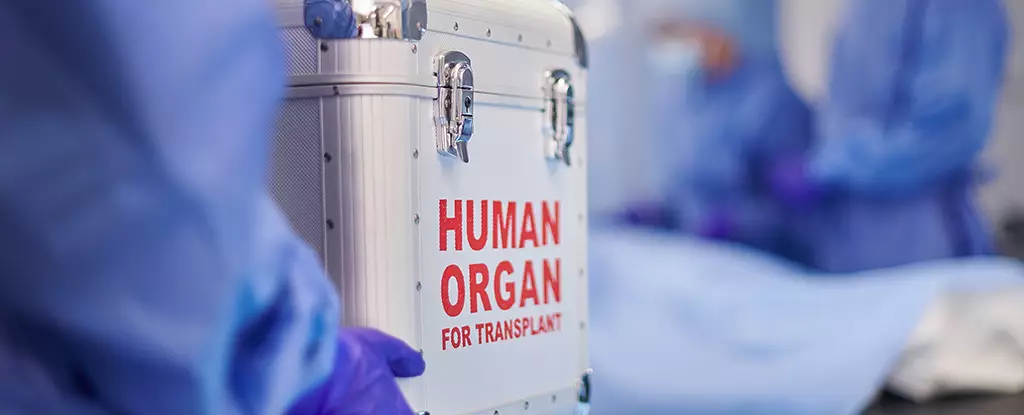In October 2021, a deeply unsettling incident unfolded in a Kentucky hospital involving a man named Anthony Thomas “TJ” Hoover II, raising explicit concerns about the protocols governing organ donation in American healthcare. The alarming scenario surfaced when TJ, who had been declared brain dead following a drug overdose, reportedly regained consciousness as surgeons prepared to harvest his organs. Nyckoletta Martin, a whistleblower and organ preservationist, brought this case to light during a letter to the US House of Representatives’ Energy and Commerce Committee, underscoring the ethical and procedural breaches that might have occurred during the evaluation of TJ’s death.
The case’s gravity is manifold, as it questions the very foundation upon which organ donation processes stand. Instances of miscommunication or misjudgment during such critical moments could lead to unimaginable consequences for patients and families alike. TJ’s case has become emblematic of a dire need for stringent reform in organ donation protocols across the United States.
TJ Hoover’s ordeal began after he was rushed to Baptist Health Hospital, where he endured a cardiac arrest. Following the declaration of brain death, medical staff initiated procedures to attain organ donations in accordance with TJ’s wishes. However, what transpired in the operating room defies all rational medical expectations. Witness accounts from his sister and other family members indicated that TJ’s eyes were open, seemingly as he evaluated his surroundings, leading staff to dismiss these signs as reflexive motions common in such situations.
These initial reactions were followed by a dramatic and alarming turn of events in the operating room. Reports state that TJ exhibited more pronounced and distressing movements — a scenario that caused chaos among the personnel. This culminated in surgeons refusing to proceed with the organ donation, while the Kentucky Organ Donor Affiliates (KODA) allegedly sought to continue the process, a narrative KODA publicly disputes.
Such disarray raises critical questions about the depth of understanding in determining brain death, especially when clinical signs may obscure the truth of a patient’s situation. The horror of waking up while organ removal procedures are underway cannot be overstated. As articulated by Martin, this incident strikes at the core of public fear, reinforcing that such a reality is something that no individual would wish to experience.
The existing organ donation framework in the United States appears to be at a crossroads. Concerns regarding the strictness and accuracy of the clinical criteria that define brain death are paramount. There is an imperative to balance the need for organ donations against the ethical obligation to ensure patients are truly deceased before harvesting begins. Setting parameters too tightly could unjustly occupy life-saving resources, while being too lenient can lead to grievous errors, as evidenced by the case of TJ.
Additionally, there are broader implications at play concerning the efficiency of the organ donation system in the U.S. More than 100,000 patients await organ transplants, but the number of successful transplants, although substantial at around 46,000 annually, remains woefully inadequate. This disparity highlights the need for not only transparent operations but also educational initiatives aimed at clarifying the organ donation process for families and the society at large.
Federal oversight, indeed, may need reevaluation, especially as the Health Resources and Services Administration probes deeper into this catastrophic incident. Stakeholders in the healthcare sector must address the public’s concerns regarding the reliability and safety of organ donation protocols, ensuring such tragic oversights are obliterated for good.
With the medical community confronting the ramifications of this startling incident, there emerges an opportunity for substantial reform in the organ procurement process. Ensuring that organ donation systems prioritize patient safety, alongside maintaining ethical standards, must become a foremost issue. The challenge lies in creating criteria that are both sensitive and rigorous, shoring up the confidence of the public while promoting organ donation.
The tragic yet miraculous survival of TJ Hoover II serves as a poignant reminder of the human element within the healthcare system—a system that must safeguard against potential tragedies. In turn, it necessitates accountability, vigilance, and regular review of its operational practices to avoid the disturbing prospects of waking up in an operating room designed not for healing, but for harvesting.
As investigations continue, it’s crucial that the story of TJ spurs a movement for change that ultimately ensures the sanctity of life, the respect for individual autonomy, and the humane treatment of those navigators within the complex maze of organ donation and medical ethics. In an era where lives can hinge on the resourceful acts of humanity, the stakes could not be higher.

